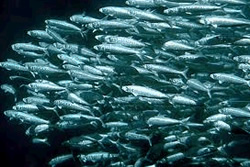 Some of the world’s largest fisheries target small, schooling fishes called forage fish, species that are principal prey items in the diet of larger fish, marine birds and marine mammals A new study headed by Dr. Ellen Pikitch, Executive Director of the Institute for Ocean Conservation Science (IOCS) at SoMAS, recommends that fisheries for forage species should be cut in half to allow these species to more completely fulfill their critical role in marine ecosystems. Pikitch led the work of the Lenfest Forage Fish Task Force, an international panel of preeminent scientists from a variety of fields that conducted the most comprehensive assessment of the science and management of forage species ever undertaken. The Task Force concluded that leaving more forage fish in the ocean will result in healthier populations of many of the top predatory fish, which are themselves targeted by fisheries. The economic cost of lowered forage fish harvests would, on a global basis, be more than offset by increased catches and economic returns of these species higher up the marine food chain. A science summary of the final report, “little fish Big Impact,” is available; the full report is available on the Lenfest Ocean Program, who provided financial support for the work of the Task Force.
Some of the world’s largest fisheries target small, schooling fishes called forage fish, species that are principal prey items in the diet of larger fish, marine birds and marine mammals A new study headed by Dr. Ellen Pikitch, Executive Director of the Institute for Ocean Conservation Science (IOCS) at SoMAS, recommends that fisheries for forage species should be cut in half to allow these species to more completely fulfill their critical role in marine ecosystems. Pikitch led the work of the Lenfest Forage Fish Task Force, an international panel of preeminent scientists from a variety of fields that conducted the most comprehensive assessment of the science and management of forage species ever undertaken. The Task Force concluded that leaving more forage fish in the ocean will result in healthier populations of many of the top predatory fish, which are themselves targeted by fisheries. The economic cost of lowered forage fish harvests would, on a global basis, be more than offset by increased catches and economic returns of these species higher up the marine food chain. A science summary of the final report, “little fish Big Impact,” is available; the full report is available on the Lenfest Ocean Program, who provided financial support for the work of the Task Force.
For more information:
Lenfest Forage Fish Task Force
science summary
Lenfest Ocean Program




You must be logged in to post a comment.